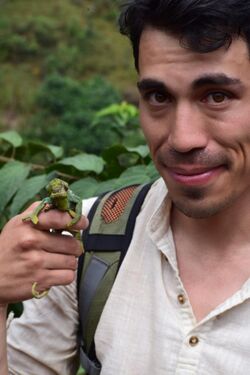Biography:Benjamin Chan
Benjamin Chan | |
|---|---|
 | |
| Born | Salt Lake City, Utah |
| Known for | Phage Therapy |
| Scientific career | |
| Institutions | Yale University |
| Website | www |
Benjamin K. Chan (Chinese: 陳家明) is a research scientist at Yale University in the department of Ecology and Evolutionary Biology.[1] He was born in 1980 to a U.S. Asian father, an engineer, and an American mother. He is known for his work in phage therapy exploiting genetic trade-offs to treat antibiotic resistant bacterial infections. He currently lives in Guilford, Connecticut.
Phage therapy
In January 2016, Chan treated an antibiotic resistant infection of a Dacron aortic graft caused by the superbug Pseudomonas aeruginosa,[2] this treatment reinvigorated phage therapy in Western medicine. Following this successful treatment, a second case of superbug infection was treated by Chan and others at Texas Tech University Health Sciences Center. This case involved use of nebulized phage to treat a multidrug resistant lung infection in Paige Rogers, a woman with cystic fibrosis[3][4][5] and the research involved was featured in the Netflix series, "Follow This." He has since been featured in documentaries produced by Vice,[6] Freethink,[7] and BBC One.[8] Following the publication of his first two cases, Chan and others have since treated multiple infections at Yale New Haven Hospital successfully.[9][10]
References
- ↑ "Research Scientists | Department of Ecology & Evolutionary Biology". https://eeb.yale.edu/people/research-scientists.
- ↑ Narayan, Deepak; Elefteriades, John A.; Mojibian, Hamid R.; Kim, Samuel; Turner, Paul E.; Chan, Benjamin K. (2018-01-01). "Phage treatment of an aortic graft infected with Pseudomonas aeruginosa". Evolution, Medicine, and Public Health 2018 (1): 60–66. doi:10.1093/emph/eoy005. PMID 29588855.
- ↑ "Paige and the Virus Hunter". 2018-11-28. https://www.freethink.com/articles/paige-and-the-virus-hunter.
- ↑ "This Scientists Used Live Viruses To Save A Woman's Life From A Superbug Infection". 12 November 2018. https://www.buzzfeednews.com/article/azeenghorayshi/phage-therapy-follow-this.
- ↑ Jan 12, CBC Radio · Posted; January 11, 2019 12:00 PM ET | Last Updated. "Viruses that kill superbugs could save lives when antibiotics don't work | CBC Radio". https://www.cbc.ca/radio/quirks/jan-12-2019-medieval-woman-painters-houseplants-eat-pollution-viruses-that-kill-superbugs-and-more-1.4972835/viruses-that-kill-superbugs-could-save-lives-when-antibiotics-don-t-work-1.4972845.
- ↑ Koebler, Jason; Oberhaus, Daniel (2017-12-07). "Viruses Are the Antibiotics of the Future". https://motherboard.vice.com/en_us/article/9kdbqa/bacteriophages-phage-therapy-antibiotic-resistant-bacteria.
- ↑ Fighting Superbugs with Viruses, 2018-11-27, https://www.freethink.com/videos/paige-s-phages, retrieved 2019-03-22
- ↑ "BBC One - The Truth About..., Antibiotics". https://www.bbc.co.uk/programmes/b0c1nl68.
- ↑ "Using 1 Germ to Fight Another When Today's Antibiotics Fail". The New York Times. Associated Press. 2019-02-26. ISSN 0362-4331. https://www.nytimes.com/aponline/2019/02/26/health/ap-us-med-antibiotic-alternatives.html.
- ↑ "Bacteriophages to the Rescue: A Possible Approach to Antibiotic Resistance". https://www.biospace.com/article/bacteriophages-new-approaches-when-antibiotics-fail/.
 |

